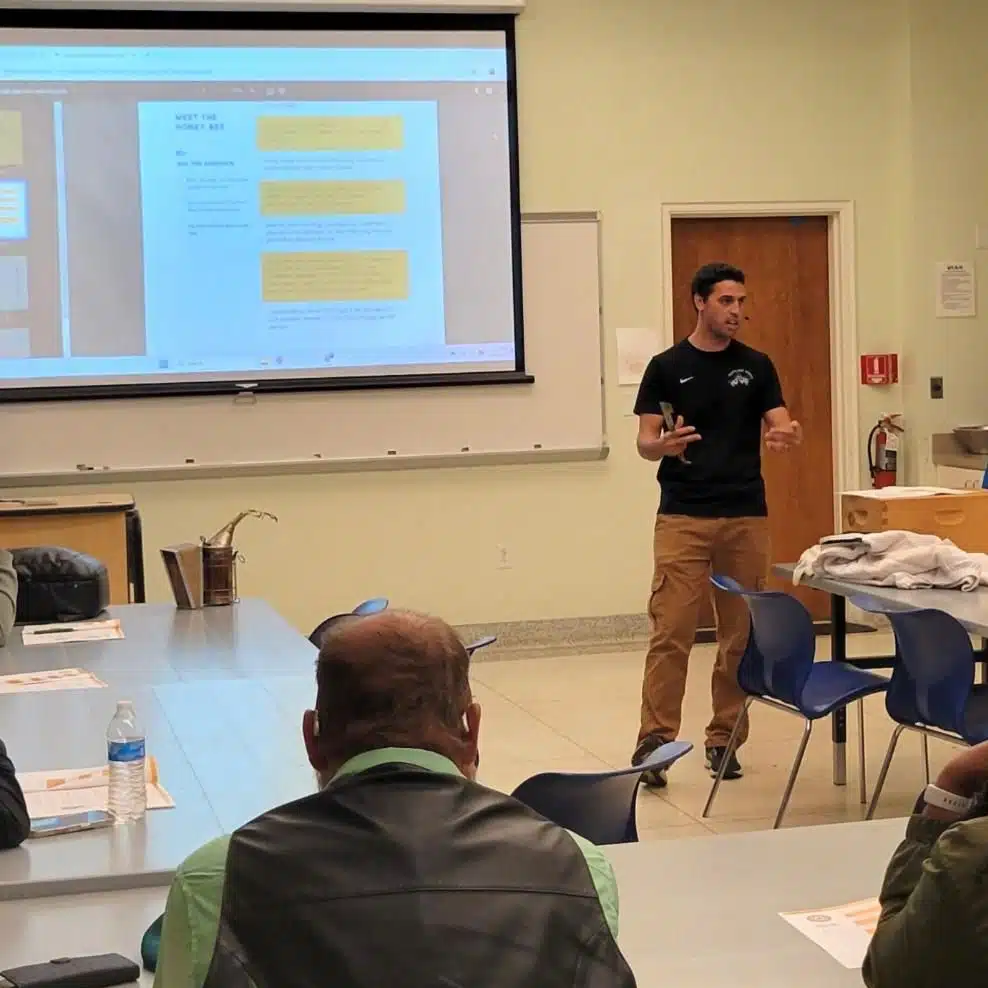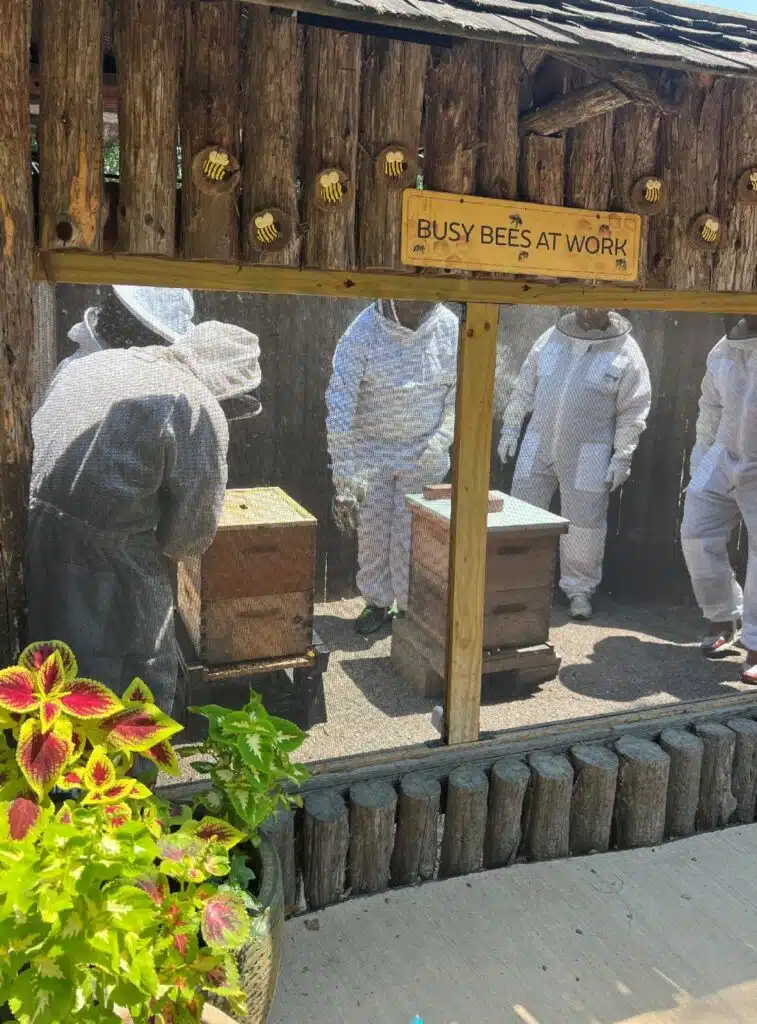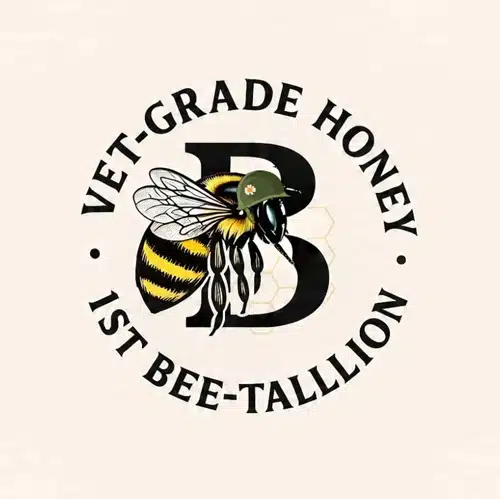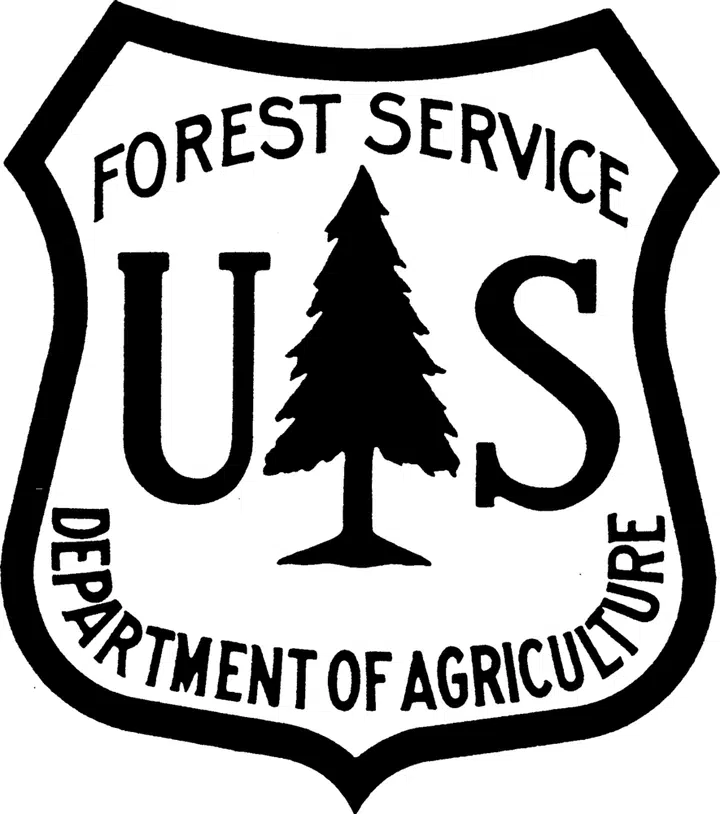Veterans Find Healing in the Beehives at Cleveland Botanical Garden
August 28, 2025

Our fascination with bees is as old as time itself. The Paleolithic cave art in Spain shows honey hunters perched on cliff faces 10,000 years ago. In ancient Egypt, the bee was a sacred symbol and even thought to be a messenger with the spirit world. Throughout the ages, bees have symbolized industry, magic, protection, royalty, healing, order, and purity. Somehow, they’ve always carried the power of transformation.
Justin Sofio, founder of Youth Bee Works, experienced this power first-hand on a trip to Croatia 15 years ago. “I bought a jar of honey with honeycomb inside and was completely enthralled,” he said. “That honey was so intriguing to me that I decided right then and there to try keeping my own beehives when I returned home.”
He did but soon discovered that beekeeping has a steep learning curve. There are so many nuances, rules, and exceptions to rules. There are no shortcuts or ways around the fact that you need experience, or “time in the box” as Justin likes to say. “For the first few years, I fell flat on my face, but eventually, I got better,” he recalls.
Originally, beekeeping was a hobby, but he didn’t have a business around it. Friends and neighbors were buying honey from him, and he started giving presentations in schools. Before long, Justin wondered if his passion for beekeeping could also be his life mission. He explained: “The idea grew in my heart and doors kept opening. In 2016, I decided to take it to the next level and created Youth Bee Works, a non-profit focused on honeybee education.”

“Cleveland chose me”
Justin was living in Chicago but was able to get a grant and funding for beehives at Ohio City Farm, now called Resource Cleveland. “I didn’t choose Cleveland – it chose me,” he says.
Today, Youth Bee Works partners with over 15 schools and organizations like EDWINS and Great Lakes Brewing Company, which makes a few honey beers and ales, showcasing its commitment to local ingredients.
This summer Justin is pleased to embark on a new collaboration: the HIVES (Honeybee Initiative for Veteran’s Empowerment and Support) — a powerful education and wellness initiative with the Veterans Administration (VA) and Holden Forests & Gardens (HF&G). The Whole Health program helps veterans increase their well-being by caring for bees. The VA has conducted studies proving it helps the veterans to focus and decrease stress levels.
How does it work? Beekeeping engages all your senses. When you pop open a hive with 80,000 bees, you’re listening for the temperament of the hive. There’s the happy buzz. And then there’s the angry buzz. And then visually you are looking through the hive to spot any yellow flags. You’re automatically engaged in the present moment. You don’t have a choice. That level of focus is incredibly therapeutic.

“I’m excited to teach this tangible skill that they can carry with them wherever they go,” said Justin. “I am also pleased to work with HF&G, an organization that shares my reverence for nature and the environment,” he added.
Two hobby beehives are set up in a special area in the Hershey Children’s Garden. There are 15 veterans in the 8-week class this summer who meet every Monday afternoon for both classroom and hands-on learning.
The “Bee-talion” reports for duty
During class this week, the beekeeping cohort from the Cleveland VA started with some gentle stretching and breathing before digging into their collaborative project for the day: the design of a label for their honey jars. There were lots of ideas, sketches, and creative taglines, but one thing everyone agreed on was dubbing themselves the “1st Bee-talion” producing pure, vet-grade honey.
The beekeepers-in-training filed outside on a gorgeous summer day to the Hershey Children’s Garden to do a hive check with Justin and his team. Five of the vets suited up and got ready to inspect the hives. Justin says, “A hive check is to take the pulse of the hive. We’re checking for the Queen – is she doing her job and laying eggs?”
With beekeeping, you need to be prepared that sometimes it doesn’t work out. If the bees know something is wrong with the hive, they will up and leave to find a new home. “Don’t be easily discouraged,” advises Lexie St. Denis, Justin’s associate at Youth Bee Works. “Have an Apiary Action Plan and list your goals. Are you keeping bees to help them survive the winter, or are you harvesting honey…or both?” Many novice beekeepers start small and expand their goals as they learn more and gain confidence.
Today’s news was good: both hives humming and healthy.
Spreading the wonder of honeybees
Youth Bee Works focuses on education, but Justin wants people to feel a sense of wonder and awe when learning about bees. “I didn’t want it to feel like school,” he said.
“The hum of bees is the voice of the garden.” – Elizabeth Lawrence
That’s why its mission statement is “spreading the wonder of honeybees.” Justin and his team are bringing awareness to the importance of honeybees and why they are essential to our environment. The organization helps people understand pollination, commercial agriculture, commercial beekeeping, food sustainability, and conservation. And most importantly, they teach people to be more reverent of these little pollinators.
What does your neighborhood taste like?
There’s probably nothing healthier than eating raw, local honey. It is a natural antiseptic and can help with seasonal allergies. It’s packed with vitamins and antioxidants and is used all over the world to treat a variety of maladies, from soothing coughs to healing wounds.

“The only reason for being a bee is to make honey. And the only reason for making honey is so I can eat it.” – Winnie the Pooh
All that healthiness aside, honey tastes good, too. Just ask Winnie the Pooh. And it tastes different depending on where you are. “I always ask people, hey do you want to find out what your neighborhood tastes like?” said Justin. “One of the coolest things about this project is the hives are based in an urban sanctuary of flowers and biodiversity. So, what do the Cleveland Botanical Gardens taste like? We’re about to find out!”
The veterans enjoyed a taste preview earlier this summer and are looking forward to the big harvest in October. “It tastes sweeter than store-bought honey,” one student said. Whether the extra sweetness comes from the bounty of nectar at the Cleveland Botanical Garden, or the rewards of their effort, it’s the taste of success all the same.
The industry of bees
You can think about bees as providing products and services. The products are pollen, propolis (a natural resinous mixture used to repair hives), and honey. The service is pollination. Each beehive is its own industry. And the queen is the captain of industry.
“As a beekeeper, I’m using those products in different ways,” explains Justin. “Or I’m putting them into other products, like hand lotions, shampoos, beeswax, and soap.” Propolis is antibacterial and antifungal and so is honey. Honey is the only food substance that lasts forever. It will never go bad. Pure honey will crystallize and become solid over time, but you just warm it up to re-liquify it, and you can do that a thousand times.
Justin is emphatic: “I believe it’s the most powerful food on the planet.”
But the bee industry faces a crisis of staggering scale. We are in the midst of the largest US honeybee die-off on record, with beekeepers losing on average 60% of their colonies. This impacts commercial agriculture, which relies on honeybees for pollination, and as such, could impact our fruit, nut, and vegetable supply. As recently reported in The Guardian, “a research paper published by the US Department of Agriculture (USDA), though not yet peer-reviewed, has found nearly all colonies had contracted a bee virus spread by parasitic mites that appear to have developed resistance to the main chemicals used to control them.”
However, it’s likely that more factors are involved, including the changing climate, exposure to pesticides, and more stresses, making the hives less healthy and resilient.
Justin has seen this massive dip in bee population first-hand. “I’m friends with beekeepers who have lost whole bee yards – 40 hives gone. It’s devastating.”
He continues, “Bees aren’t pollinating nachos and ice cream. They’re pollinating the healthiest foods on the planet — fruits, vegetables and nuts. These are things that we want more of, not less.”
Calling all pollinators
So, what can we do to help the bees and other pollinators in our front and back yards? Justin suggests we plant native species, especially Milkweed (benefits both monarch butterflies and honeybees); Lavender (blooms twice, doubling nectar availability), and Sunflowers (help bees naturally combat mite infestations).
And remember, if you are nervous about attracting bees to your yard, honeybees aren’t aggressive unless provoked. Unlike wasps and hornets, which are carnivores, honeybees only collect nectar. Plus, when honeybees sting, they die—so they avoid it unless absolutely necessary.
To identify a honeybee: look for a wide, hairy body and stout legs. Wasps and hornets? Skinny waists, smooth bodies, and far less charm.
How sweet it is
“How many of you are interested in keeping your own hives?” Justin asked the group. Several hands shot up. It’s the right balance of physical and mental activity, someone said.
Everyone agreed and asked more questions about the structure and caring of the hives, stacked two by two, a perfect model of community, industry, and harmony.
To wrap up for the day, Justin emphasized the golden rule of beekeeping, “Never pull from the bottom box of the hive – that honey is for the bees.” It’s an insurance policy, if you will, so they always have something to eat in any kind of bad weather. Just like this program gives the veterans tools and techniques to be healthy and resilient through good times and bad.
Let’s hear it for the 1st Bee-talion from the Cleveland VA, Youth Bee Works, and the Cleveland Botanical Garden – a force for good, mobilizing hope and healing with hive-minded purpose, one day at a time.
Terri White
Grants & Communications Specialist













